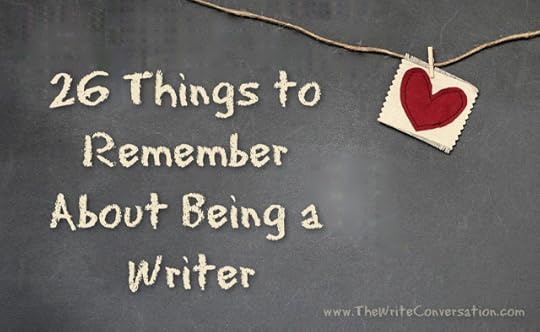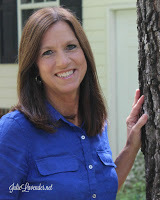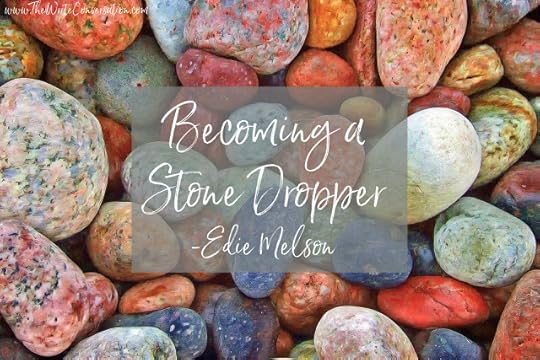Edie Melson's Blog, page 214
January 9, 2020
26 Things to Remember About Being a Writer

by Edie Melson @EdieMelson
Lately I've had a lot of folks ask me what it takes to become a writer.
The real answer takes hours, but today I decided to just boil it down to the basics.
26 Things to Remember About Being a Writer
A is for Adventure. The Writer’s life is definitely full of surprising twists and turns—we never know when we’ll be ambushed by an idea or spend half a day looking for just the right word.
C is for Cathartic. The experiences I’ve had in life always seem to creep into my writing, even if they’re unrecognizable to anyone else. Processing what I’ve been through with words has been a good thing.
D is for Discipline. To be a writer, you must…well…write. It’s not often easy, but it is fulfilling.
E is for Encourage. Yes, we need to encourage others with our words. But even more importantly, we need to use our words to encourage ourselves. Don’t be your own worst enemy by constantly talking down to yourself.
F is for Failure. Failure is an option, and anyone who’s told you differently is lying. I often learn more through failure than through success. It’s painful, but knowing something good comes out of my mistakes often makes them less painful.
G is for Gratitude. Having the freedom of being a writer is a gift I will never take for granted.
H is for Hard. Choosing to be a writer means a lifetime of hard work. It’s rewarding and satisfying, but not easy.
I is for Illustrate. Yes, that’s an artsy sort of word, but I chose it on purpose. Never forget that you are an artist and you illustrate life with words.
J is for Jealousy. It’s far too easy to compare our own journey with that of other writers. It’s easy, but not productive. Each of us has a different path and we need to be striving for excellence, not keeping score with one another.
K is for Knowledge. As writers, the education never ends. We never arrive at the place of knowing it all, so we’re always continuing our education.
L is Long. There are no shortcuts in the writing life. When we choose this path we need to remember to take the long view.
M is for Manna. For me, the words often appear only as I need them. They are gifts from God.
N is for Networking. I know, we’re all introverts and can’t stand the thought of interacting. But the truth is, we need each other. Not just to earn a living and get paid. We need one another for encouragement and to be reminded that we really aren’t crazy.
O is for Odd. That’s what writers are—odd. We look at things just a little differently from the rest of the world. That’s not something to be ashamed of, it’s a gift.
P is for Peace. We must learn to be content with our gift and the way it plays out. This business isn’t always fair, but things do tend to even out over time. To experience the heights of joy, we must be willing to walk through the valley’s of despair.
Q is for Quality over Quantity. It's easy to get caught up in the numbers game. We look for the number of words, the number of published pieces, the number of followers, reviews, etc. But it's the quality we need to focus on, no matter what the numbers say.
R is for Rhythm. Good writers know that words must have rhythm. There’s a certain cadence necessary for everything we write.
S is for Send. We were giving this gift of writing for a purpose. We’re being sent into the world to share what we’ve observed. This means we need to hit send and be willing to risk having others read what we’ve written.
T is for Trust. I need to trust that God has called me as a writer and that my words have value.
U is for Unique. So often writers struggle with the fact that they don’t have anything new to share. The truth is that each of us is one-of-a-kind. Even if we all write about the exact same thing, it will be from a different and unique perspective.
V is for Vanquish. There are lots of battles that come with the writing life and the most powerful is fear. We must face the fear we face and vanquish it.
W is for Want. We must each decide how much we want to write. Finding time to write is a lie. The truth is that we must carve out time to write. To do that, we must want it badly enough to give up some things to make it a priority.
X is for Xerophilous. This word means flourishing in a dry environment. As writers, we must write whether we’re in the mood or not. We write when we’re full and when we’re empty. Some of my best work has come by learning to flourish in a dry time.
Y is for Yes. It’s easy to say yes to doing something we know we can accomplish. The true test is saying yes, when we’re uncertain. Being a writer means saying yes—yes to new things, yes to impossible deadlines, and yes to always stretching and growing.
Z is for Zoo. And that’s about as good a description of the writing life as I've found!
These are the things I’ve come up with. I’d love to know what you’d add or change to my Writing Life Alphabet.
Don’t forget to join the conversation!Blessings,Edie
TWEETABLE26 Things to Remember About Being a Writer - @EdieMelson (Click to Tweet)
 Edie Melson is a woman of faith with ink-stained fingers observing life through the lens of her camera. No matter whether she’s talking to writers, entrepreneurs, or readers, her first advice is always “Find your voice, live your story.” As an author, blogger, and speaker she’s encouraged and challenged audiences across the country and around the world. Her numerous books reflect her passion to help others develop the strength of their God-given gifts and apply them to their lives. Connect with her on her website, through Facebook, Twitter and Instagram.
Edie Melson is a woman of faith with ink-stained fingers observing life through the lens of her camera. No matter whether she’s talking to writers, entrepreneurs, or readers, her first advice is always “Find your voice, live your story.” As an author, blogger, and speaker she’s encouraged and challenged audiences across the country and around the world. Her numerous books reflect her passion to help others develop the strength of their God-given gifts and apply them to their lives. Connect with her on her website, through Facebook, Twitter and Instagram.
Published on January 09, 2020 22:00
January 8, 2020
20/20 Vision for Writing in the New Year

by Julie Lavender @JLavenderWrites
I don’t really like making resolutions, because then I’m disappointed in myself when I forego them even before the calendar flips to the second month of the year. But I do like to set goals and daydream about my writing year ahead.
This year, with the uniqueness of a new decade and a few memes already floating around about “the year of perfect vision” – I decided to peruse God’s word for scriptures about “eyes” and “sight.” I examined the verses to see what insightI could glean about my writing. (Yeah, I went there … but now that that’s over, I’ll try not to make a spectacle of myself and just focus on the vision.)Here were some of my favorites:
Open my eyes to see the wonderful truths in your instructions. Psalm 119:18 NLT
Once more Jesus put his hands on the man’s eyes. Then his eyes were opened, his sight was restored, and he saw everything clearly. Mark 8:25 NIV
Set your gaze on the path before you. With fixed purpose, looking straight ahead, ignore life’s distractions. Proverbs 4:25 TPT
I will set no wicked thing before mine eyes. Psalm 101:3 KJV
For we walk by faith, not by sight. 2 Corinthians 5:7 NASB
And then God answered: “Write this. Write what you see. Write it out in big block letters so that it can be read on the run. This vision-message is a witness pointing to what’s coming. It aches for the coming – it can hardly wait! And it doesn’t lie. If it seems slow in coming, wait. It’s on its way. It will come right on time.” Habakkuk 2:2-3 MSG
But as it is written: “Eye has not seen, nor ear heard, nor have entered into the heart of man the things which God has prepared for those who love Him.” 1 Corinthians 2:9 NKJV
For his eyes are on the ways of a man, and he sees all his steps. Job 34:21 ESV
Once I found my favorites, I put them together in a prayer for perfect writing vision in the first year of the new decade.
Dear God,
As a new year dawns and I ponder the path of my writing journey, open my eyes to your Word and the words that you want me to write. Restore my sight and set my mind on the writing tasks you have for me, overcoming past rejections with wisdom learned from those attempts.
Help me see clearly your plans and your will for my writing journey. Help me write with purpose, diligently and obediently, ignoring the distractions that seek to take me off the path you’ve planned. Keep my eyes and mind and heart from every evil, so that I can truly focus on you and your goodness.
Help me walk by faith, God, when acceptances don’t appear in my timeframe. Please give me the words to write your vision, words that point to you and bring all praise and glory and honor to you.
I thank you in advance, God, for the writing successes that will come my way this year, in whatever form that takes – from friendships with fellow writers to an enhanced relationship with you through my prayers to opportunities to share the gospel and change lives through my writing to the possibility of mentoring other writers and maybe, just maybe to the chance of a writing contract.
God, I take comfort in knowing that your eyes are always on me. Please help me keep my eyes on you, with perfect vision, throughout all of 2020.
Amen.
Do you have a writing prayer this year? I’d love for you to share that prayer below.
Happy New Year! May God grant you writing clarity and bless your writing exceedingly and abundantly throughout the days ahead!
TWEETABLE20/20 Vision for Writing in the New Year - @JLavenderWrites on @EdieMelson (Click to Tweet)
 Julie Lavender loves an excuse for a celebration, and the month of November reminds her to count blessings all the way to the Thanksgiving feast with family and friends. She is especially grateful this month for two book blessings: the recent release of Come and Behold Him, a co-authored book with Michelle Cox, prolific author who pens the When God Calls the Heart series, devotional books based on the content of the television show, “When Calls the Heart.” The devotional is available at Amazon, Target, and bookstores. And, the manuscript for her first book with Revell Books, Baker Publishing Group, is due on November 15 to editor Vicki Crumpton, whom Julie first met at Blue Ridge Mountains Christian Writers Conference three years ago.
Julie Lavender loves an excuse for a celebration, and the month of November reminds her to count blessings all the way to the Thanksgiving feast with family and friends. She is especially grateful this month for two book blessings: the recent release of Come and Behold Him, a co-authored book with Michelle Cox, prolific author who pens the When God Calls the Heart series, devotional books based on the content of the television show, “When Calls the Heart.” The devotional is available at Amazon, Target, and bookstores. And, the manuscript for her first book with Revell Books, Baker Publishing Group, is due on November 15 to editor Vicki Crumpton, whom Julie first met at Blue Ridge Mountains Christian Writers Conference three years ago. Besides writing for her local newspaper, Julie contributes to Guideposts Publications, other magazines, a couple of homeschooling blogs, Just18Summers.com, and many compilations. Combining her education degree, love of homeschooling, and joy of celebrating, Julie wrote a devotional entitled, 365 Days of Celebration and Praise, a party planning book called, Creative Sleepovers for Kids, and three teacher resource books for the religious division of Carson-Dellosa. Julie and David are enamored with their four adult children, one son-in-love, and one gorgeous grandson. Keep up with Julie on social media and at her blog at julielavender.blogspot.com.
Published on January 08, 2020 22:00
January 7, 2020
Writing for Faith-based Markets - 3 Important Tips

by Linda Gilden @LindaGilden
“12 Markets for Faith-based Writers.”
The title of the article drew me in. I am always looking for new markets to write for, particularly magazine markets.
I quickly followed the link, which took me to a site that, indeed, listed markets for faith-based writers. But it didn’t take me long to find that I was unqualified to write for any of them. Why?
I had done what most of us do. When we see the words “faith-based.” We assume the publications are Christian publications. I have to admit in the beginning I was a bit shocked. In my little sheltered corner of the writing world, I spend a lot of time writing faith-based material. Because my faith is Christian, that means sharing Jesus through my writing and approaching life from a Christian worldview.
Our writing will come from the point of our deepest belief no matter what our faith. But I can only speak as a Christian writer. Several factors must be considered if we are Christian faith-based writers.Know where you stand. When writing from a perspective of your faith, you cannot be wishy-washy. Know the tenets of your faith. Christian writers should be well-versed in the Bible and put God’s principles into practice daily. Writing from the overflow of your faith puts passion into your words.Stand firm. Christians must be firmly committed and not waiver in a time when criticism and opposition abounds. Your words may be challenged by those who don’t believe as you do. Knowing exactly what you believe is essential to standing on Truth.Stand proud. It is a privilege and honor to be a Christian writer. Don’t take that lightly. Your readers are looking to you for wisdom and encouragement. Share the hope that is part of the Christian faith.
Many of you reading this are passionate about sharing your faith through your writing. You are a light to a dark world. Even if a writing opportunity is not called faith-based, it will be written from a biblical worldview. Stand for what you believe in everything you write and make the most of every opportunity to share your faith.
TWEETABLESWriting for Faith-based markets - 3 Important Tips - @LindaGilden on @EdieMelson (Click to Tweet)
 Linda Gilden is an award-winning writer, speaker, editor, certified writing and speaking coach, and personality consultant. Linda is the author of 19 books and over 1000 magazine articles. She enjoys every meeting with editors and knowing we are all part of the same team. Linda’s favorite activity (other than eating folded potato chips) is floating in a pool with a good book surrounded by splashing grandchildren—a great source of writing material! www.lindagilden.com
Linda Gilden is an award-winning writer, speaker, editor, certified writing and speaking coach, and personality consultant. Linda is the author of 19 books and over 1000 magazine articles. She enjoys every meeting with editors and knowing we are all part of the same team. Linda’s favorite activity (other than eating folded potato chips) is floating in a pool with a good book surrounded by splashing grandchildren—a great source of writing material! www.lindagilden.com
Published on January 07, 2020 22:00
January 6, 2020
Writing Control Freak 101

by PeggySue Wells @PeggySueWells
New York Times bestselling author of more than 60 book in 24 languages, Shirley Jump didn’t have the willpower to diet nor the talent to master under-eye concealer, so she bowed out of a career in television for a career where she could be paid to eat at her desk—writing. As a wife, mother, and author, what words have kept her anchored? She shares them here.The only thing you can control is the words you put on the page. Fellow author, JoAnn Ross, said this on an e-mail loop.
I remember being in a funk that day because my recently released book wasn’t selling as I had hoped, my editor wasn’t reading my next proposal, and a reviewer had panned another book.
Anyone in this industry knows there are more of those experiences than occasions to celebrate because the sales come far between, and the frustrations of the publishing industry are many. I had gotten into a habit of letting those irritations affect my writing days. The words took a backseat as I scrambled to increase sales on a book already on store shelves, and brainstorm ways to reach readers. I thought that if I did this, or tried that, everything would be perfect. Then the words would flow.
Most writers are control freaks. We control the universes we create, populate them with characters we design, throw them into dilemmas we imagine, and move them like little people on a chessboard. We’d love to do the same with our careers. Manipulate the industry, move our books to the front of the advertising dollars line, make stores display volumes prominently, and assure every reader hears about this wonderful story we have penned.
Instead, we send off the book and wait and pace and worry, complain to friends, scour articles on how to increase word of mouth, and debate whether to increase the personal marketing budget. All the while, the next book isn’t getting written.
JoAnn’s advice came at the right time. I pasted the words over my monitor, repeated that mantra to start my day, and remind myself to get to work. I found myself happier doing my job, and much more relaxed.
I can’t control whether my editor buys my next proposal or whether marketing puts money behind my book. I can’t control distribution or reviewer comments or the number of readers that purchase the title. I can have some influence, sure, but 99 percent of that process is out of my hands. The only part I control is the words I put on the page today. The second that manuscript wings its way to my editor’s desk, other people are in charge of the book’s destiny.
I work hard to get the word out about my current releases. However, I worry less. I went into this business because I love to write. When I’m deep in the heart of a book, it’s a blissful place. I let other people do the rest. And I do what I do best. Write.
TWEETABLEWriting Control Freak 101 - wisdom from @PeggySueWells on @EdieMelson (Click to Tweet)
 Tropical island votary and history buff, PeggySue Wells parasails, skydives, snorkels, scuba dives, and has taken (but not passed) pilot training. Writing from the 100-Acre wood in Indiana, Wells is the bestselling author of twenty-eight books including The Slave Across the Street, Slavery in the Land of the Free, Bonding With Your Child Through Boundaries, Homeless for the Holidays, and Chasing Sunrise. Optimistic dream-driver, PeggySue is named for the Buddy Holly song with the great drumbeat. At school author visits, she teaches students the secrets to writing, and speaks at events and conferences. Connect with her at www.PeggySueWells.com, on Facebook at PeggySue Wells, and Twitter @PeggySueWells.
Tropical island votary and history buff, PeggySue Wells parasails, skydives, snorkels, scuba dives, and has taken (but not passed) pilot training. Writing from the 100-Acre wood in Indiana, Wells is the bestselling author of twenty-eight books including The Slave Across the Street, Slavery in the Land of the Free, Bonding With Your Child Through Boundaries, Homeless for the Holidays, and Chasing Sunrise. Optimistic dream-driver, PeggySue is named for the Buddy Holly song with the great drumbeat. At school author visits, she teaches students the secrets to writing, and speaks at events and conferences. Connect with her at www.PeggySueWells.com, on Facebook at PeggySue Wells, and Twitter @PeggySueWells.
Published on January 06, 2020 22:00
January 5, 2020
Systems for Writers in 2020
 by Ralene Burke @RaleneB
by Ralene Burke @RaleneBI almost didn’t write about consistency in this post because Edie Melson posted about Intentional Consistency last Monday. However, I thought I could come at it from a bit of a different angle and share with you my personal vision.
See, BE CONSISTENT is my theme for 2020.Over the last few years, I have grown more and more inconsistent in most areas of my life. Sure, many would agree that the kind of obstacles I’ve had thrown at me would more than cover the reason for that decline. From various serious illnesses in my family to moving to financial crisis…the list goes on.
However, one important fact has remained the same. God has always been there. God IS consistent with His desire to care for His children. His example is all we need to see how WE should strive to be. No, it’s not easy, but nothing worthwhile ever was.
As I pondered my inconsistency these last few years, I’ve realized I have not only been harming myself, but I’ve been damaging my relationships with those in my life, whether business or personal. I haven’t been the light that I’m supposed to be.
With God’s help—I aim to fix that.
For 2020, I’m not setting goals like “lose 30 lbs.” or “write 1,000 words/day.” Instead, I’ll be working on my SYSTEMS.
What are Systems?
Systems are the tools we use to ensure things in our life get done like they need to be. Some examples would be:Menu PlanningCalendars & To-Do ListsSchedules/RoutinesApps Relevant to LifeAccountability+ Many Others
How do Systems Work?
Let’s say I want to be more consistent in my writing. Instead of saying I want to write 1,000 words/day, I set up in my lifestyle a way to achieve more writing. I could:Set a time to write. For me, I’ve decided writing needs to happen first thing or it likely won’t happen at all. So, I’m going to write from about 6 a.m. to 8 a.m., Monday thru Saturday.Make sure everyone in my household knows that this is my writing time, and I am not to be bothered unless it’s a valid emergency.Make sure my desk and my laptop are all ready to go the night before so that, as soon as I finish my quiet time, I can sit down and dive in.Keep a running list on ToDoist of what (besides my novel) needs to be written and their deadlines—like blog posts and articles—and have certain days that I tackle those as well.
Systems happen naturally in most areas of our lives. But sometimes those systems need to be tweaked or even completely overhauled. If you have something in your life that you want/need to do, but it never gets done, likely your SYSTEM needs to be reconsidered.
Last year, my husband and I realized we were eating out too much, which was bad for our health, and spending too much money on it, which was not good for our savings goals. One of the biggest culprits for this habit was that we didn’t often think about dinner ahead of time and therefore never set any meat out to thaw or ensured we had other ingredients on hand. So, we started using Google Calendar to plan monthly menus, which helped us to know what we needed to lay out to thaw and helped me plan our grocery shopping better.
What are some of the other systems I’m using for 2020?ToDoist is my digital to-do list. It’s available across devices, so I have it on both my phone and my laptop. I can divide my to-do list into different categories (like I have one for personal, one for Realm Makers, one of writing, one for business…), different labels, color-coded, set priority. The app is already integrated with my Gmail account so I can easily turn emails into tasks, but I could also tie it to Google Calendar so that my tasks are listed in the calendar as well—but I haven’t done that yet.I have a “command center” at home. This is a desk by our front door, which is where we keep our purses/wallets. There’s a white-board calendar where my family can see what is coming up. There’s a holder for folders like bills, important papers, etc. It also houses our printer, since that is something we all use (my husband and I both work form home, and my kids are homeschooled).Ladies of Spec/Realm Makers: Realm Makers is my tribe of writer friends. I converse with them on the Realm Makers Consortium, where we talk about all things speculative fiction and fandoms. However, with over 1,800 members, I turn to my Ladies of Spec group (6 Realmies) for encouragement and accountability. Apex Writers is a new program from a publishing legend, David Farland. Similar to my Realm Makers tribe, this group is aimed at growing writers who have a hand on the pulse of publishing in order to grow their careers. With weekly meetings and professional training, this might be the year I finally get consistent in my writing!My Brilliant Writing Planner: While this planner is mostly aimed toward writing, there’s a lot of space for personal planning as well. There are sections for yearly, quarterly, and weekly planning/review. While I’m mostly a digital nomad, this planner is still invaluable to me.Habits is an app to start tracking habits I want to develop. For January, I just have 2: waking up at 5:30 and writing at 6. I check a box every day if I accomplished the task. If I get so many checks in a row, I get a special reward. So, it makes a game out of it. I can get pretty competitive—even with myself. Next month, I’ll add a couple more habits.
Systems play a large part in our success as writers and in life. We should evaluate our systems on a regular basis to ensure they are effective and to tweak them if they are not. Consistency comes from systems and habits. Get those in place first, then watch the results blow everyone away!
What systems/habits do you need to focus on this year?
TWEETABLESystems for Writers in 2020 - tips and suggestions from @RaleneB on @EdieMelson (Click to Tweet)
 Whether she’s wielding a fantasy writer’s pen, a social media wand, or a freelance editor’s sword, Ralene Burke always has her head in some dreamer’s world. And her goal is to help everyone #SHINE Beyond their circumstances! Her novels, Bellanok and Armor of Aletheia, are available on Amazon. More fantasy novels coming soon!
Whether she’s wielding a fantasy writer’s pen, a social media wand, or a freelance editor’s sword, Ralene Burke always has her head in some dreamer’s world. And her goal is to help everyone #SHINE Beyond their circumstances! Her novels, Bellanok and Armor of Aletheia, are available on Amazon. More fantasy novels coming soon!When her head’s not in the publishing world, she is wife to a veteran and homeschooling mama to their three kids. Her Pinterest board would have you believe she is a master chef, excellent seamstress, and all-around crafty diva. If she only had the time . . . You can also find her on Facebook, Instagram, Twitter, or at her website.
Published on January 05, 2020 22:00
January 4, 2020
Becoming a Stone Dropper

by Edie Melson @EdieMelson
When they persisted in questioning Him, He stood up and said to them, “The one without sin among you should be the first to throw a stone at her.” John 8:7 (HCSB)
Imagine with me the scene that day. A woman has been caught in the act of adultery. In biblical times, it’s a crime punishable by death—death by stoning. The men and women drag her into the public square. I can hear the voices of her accusers, raised in hatred and condemnation.
“You’re nothing but filth.”“You knew what could happen when you made your choice.”“Get rid of her. We can’t have someone like her contaminating our town.” She’s thrown at the feet of a famous teacher, for him to pronounce the death sentence. Why did they bring her to him? Because he’s known for his compassion. By bringing her crime to his attention they can literally kill two birds with one stone. They can get rid of a sinner and either expose him as a liar, or a lawbreaker.
Instead, Jesus introduces them all to the concept of grace.
And He does it without compromising the law or the heart of compassion he’s known for.
Back in the viewpoint of our sinner, I can imagine her laying there at His feet, covering her head with her arms as she tries to make as small a target as possible. Every muscle is tensed, waiting for the first stone from the angry mob.
As the crowd begins to quiet, instead of the sound of stones whistling through the air, she hears the words of the teacher. His pronouncement takes them all by surprise—even her. And I can imagine that the next sounds she hears are the thumps all around her as the stones drop to the ground.
The obvious lesson we learn from this is to extend grace to others. But just as important, we must extend grace to ourselves. When weariness crowds in, the failures also tend to overwhelm us. This is when we need to stop throwing stones at ourselves. I’ve learned to make a conscious effort to drop those stones and be an instrument of grace—even to myself.
*adapted from Soul Care When You're Weary (Bold Vision Books 2019)
TWEETABLEBecoming a Stone Dropper - thoughts on exercising God's grace from @EdieMelson (Click to Tweet)
 Edie Melson is a woman of faith with ink-stained fingers observing life through the lens of her camera. No matter whether she’s talking to writers, entrepreneurs, or readers, her first advice is always “Find your voice, live your story.” As an author, blogger, and speaker she’s encouraged and challenged audiences across the country and around the world. Her numerous books reflect her passion to help others develop the strength of their God-given gifts and apply them to their lives. Connect with her on her website, through Facebook, Twitter and Instagram.
Edie Melson is a woman of faith with ink-stained fingers observing life through the lens of her camera. No matter whether she’s talking to writers, entrepreneurs, or readers, her first advice is always “Find your voice, live your story.” As an author, blogger, and speaker she’s encouraged and challenged audiences across the country and around the world. Her numerous books reflect her passion to help others develop the strength of their God-given gifts and apply them to their lives. Connect with her on her website, through Facebook, Twitter and Instagram.
Published on January 04, 2020 22:00
January 3, 2020
The Power of Story to Bridge Divisions

by Tim Suddeth @TimSuddeth
Over the holidays, I’ve enjoyed watching the commercials for Ancestry. com. Ancestry is the company that tests your DNA and then sends back information on your family.
The commercials captured my wife and me every time. They had families coming together, the children or teens asking their parents or grandparents questions or bringing up family history they’d been told. A cozy Hallmark movie in thirty seconds.
Stories. There’s something about them that connects us more than just facts. In the above commercials, they didn’t tell us how many kits they’ve done over the years, how quickly the process is, or how far back they go. In fact, they didn’t even mention what the client had received. We only saw the family coming together to hear the story.
Eugene Peterson, in Leap Over the Wall, illustrates the power stories can hold over one’s lifetime. He wrote how his Mom would regale them with stories from the Bible, bringing them to life. When the whole community had gathered when Samuel arrived to anoint one of Jesse’s sons to be the next king, he said he could smell the hotdogs and cotton candy. Later, when he was able to study the scripture for himself, he was disappointed to learn that only the first three sons are named in the Bible. There were no Ole, Gump, Klug, or Chugger as his Mom had had described.
Is it any surprise that he later wrote the Message? He wanted to make the text to be more conversational and inviting for a novice to read or those who had read the Bible but found it too familiar.
The Ancestry commercials also showed different generations and segments stopping and coming together, which is a too rare thing to happen today. In a recent Public Agenda/USA TODAY/Ipsos poll, more than nine out of ten said it’s important for the US to try to reduce divisiveness.
It is becoming harder, not just to get people to listen, but to even be able to communicate with others. We are constantly bombarded with shouting on what we should do or believe that we are tuning it out and staying away from the noise more. It is almost impossible to tell what the facts are, they get twisted so much.
Which is why stories are so helpful. I’ve heard that we can argue facts and data, but not feelings and experiences. Telling a story helps you and your listener share a part of your life. Connecting a little.
And isn’t that what we need? Connections and not divisions. Not to always be right, but for us to come closer together.
Sounds like something Jesus would have approved of.
TWEETABLE
The Power of Story to Bridge Divisions - @TimSuddeth on @EdieMelson (Click to Tweet)
 Tim Suddeth is a stay-at-home dad and butler for his wonderful, adult son with autism. He has written numerous blogs posts, short stories, and three novels waiting for publication. He is a frequent attendee at writers’ conferences, including the Blue Ridge Mountain Christian Writers Conference and a member of Word Weavers and ACFW. He lives near Greenville, SC where he shares a house with a bossy Shorky and three too-curious Persians. You can find him on Facebook, Twitter, or at timingreenville.com.
Tim Suddeth is a stay-at-home dad and butler for his wonderful, adult son with autism. He has written numerous blogs posts, short stories, and three novels waiting for publication. He is a frequent attendee at writers’ conferences, including the Blue Ridge Mountain Christian Writers Conference and a member of Word Weavers and ACFW. He lives near Greenville, SC where he shares a house with a bossy Shorky and three too-curious Persians. You can find him on Facebook, Twitter, or at timingreenville.com.
Published on January 03, 2020 22:00
January 2, 2020
10 Ways Writers Can Fail Spectacularly at Social Media in 2020

by Edie Melson @EdieMelson
This past year, everywhere you turned someone was offering help on how to succeed with marketing, aka social media. Today I’m going to turn the tables and give you my top 10 ways to guarantee failure in 2018.
10. Never follow anyone back when they follow you. Why would you? They aren’t nearly as interesting.
9. Never answer any comments left on your blog. It’s just a waste of time to answer people who don’t know as much as you.
8. Only post social media updates when the mood hits you. After all, you’re too important to be tied to a schedule and update consistently.
7. Never promote anyone in your field or genre. Everyone knows you’re the expert, why would they need anyone else?
6. Always plan your social media updates to show up one right after another. The more updates in a row, the more people will remember you.
5. Never waste an opportunity to promote yourself. People are following you, so of course they want to hear where they can buy your book.
4. Always get even with those who’ve wronged you by calling them out publicly through social networking. After all, you’re only doing everyone else a favor by letting them know the truth.
3. Never repost/retweet anything unless there’s something in it for you. You’re much too important to repeat uninteresting fluff.
2. Always update social media with everyday life. It’s encouraging for others to know you need to take a break and visit the restroom just like an ordinary person would.
And the number 1 way to fail spectacularly with social networking…
...Don’t bother to do it at all. Everyone knows social media is just a fad.
What would you add to my list of what NOT to do with social media? Be sure to leave your thoughts in the comments section below.
Don't forget to join the conversation,Blessings,Edie
TWEETABLE
10 Ways Writers Can Fail Spectacularly at Social Media in 2020 - @EdieMelson (Click to Tweet)
Published on January 02, 2020 22:00
January 1, 2020
Putting Description into Your Story – Star Trek Holodeck style

by Sarah Sally Hamer @SarahSallyHamer
I love Star Trek. You may too. But even if you don't, you may still be able to benefit from the brilliance of their world-building. The producers of the TV shows and the movies are masters of description, although they don't use words.
Writers do use words and putting description into your story can be as easy as watching a few hours of television.
The one I watched this week was Voyager, with Kate Mulgrew playing Captain Kathryn Janeway. The episode used the Holodeck to create an Irish pub and surrounding area.
I've been to Ireland and had Guiness Irish stew at a pub in Dublin. The only real difference between Voyager's pub and the one where I ate, was that one was very real and one was not. But maybe there's another difference—how they were created.
The Dublin pub was old, with soot-covered rafters, mirrors behind the ancient, wooden bar, and scratched tables. It smelled like good Irish whiskey, just as it should. The Holodeck version probably had all that too. But it wasn't generated by centuries of people who laughed and cried, hated and loved, around the tables. The Holodeck came from a series of 1s and 0s, code entered into a computer.
Writers, of course, are closer to the data entry side than the natural progression of age. We build our worlds with words (a series of letters and 1s and 0s), adding all of the descriptions needed for a particular scene or character. To make an Irish pub in a story, we add item after item to "populate" the scene. Does our character—let's call him Ian-- need a drink? Immediately, we create a shot glass full of whiskey. How about a place to sit? Does Ian prefer a booth, a table, or a bar stool? Why? It will depend on what is to happen next, whether a private conversation, a flirtation, or a brawl.
But that's just the tip of the iceberg. A camera in a movie has the advantage of panning across the entire scene. Writers don't. So, we need to put bottles on the shelves and an old carpet on the floor and beveled windows with light streaming in, all depending on how old the pub is and what year the story is set.
So imagine you're in the Holodeck, telling the computer what needs to be in the scene. The room starts with bare, white walls and ceiling. Ask for each item and, poof!, it appears. If you ask for four round tables with chairs and then decide you like square ones better, it only takes speaking the right words and the change is made. Star Trek's Captain Janeway is attracted to a man in her story and, with a simple set of commands, makes him taller, smarter, wife-less, and attracted to her. We have that exact same control in our stories. We can "say the words" and create things and people to use them.
In my Deep Point of View blogs (LINK HERE), you can read about Belinda, a soon-to-be-ex-wife. When the doors of the courtroom open and she steps inside, the room is populated, just as if it had been there all along. But in the Holodeck, we have to add them. All of the "normal" things you'd see in a courtroom: benches, a jury box, the judge's bench, a witness box, etc., are ordered, one by one, with our words. Slowly, the room fills up. If we don't like something, or it doesn't fit correctly, we change it to what works better.
We also want to give a writer a chance to utilize an object. Description revolves around how each "thing" moves the story forward. Don't use too much description – the reader won't read paragraphs of unnecessary description. Make sure each thing described will make the story better.
What's on your Holodeck?
TWEETABLE
Putting Description into Your Story – Star Trek Holodeck style - @SarahSallyHamer on @EdieMelson (Click to Tweet)
 Sarah (Sally) Hamer is a lover of books, a teacher of writers, and a believer in a good story. Most of all, she is eternally fascinated by people and how they 'tick'. She’s passionate about helping people tell their own stories, whether through fiction or through memoir. Writing in many genres - mystery, science fiction, fantasy, romance, medieval history, non-fiction – she has won awards at both local and national levels, including two Golden Heart finals.
Sarah (Sally) Hamer is a lover of books, a teacher of writers, and a believer in a good story. Most of all, she is eternally fascinated by people and how they 'tick'. She’s passionate about helping people tell their own stories, whether through fiction or through memoir. Writing in many genres - mystery, science fiction, fantasy, romance, medieval history, non-fiction – she has won awards at both local and national levels, including two Golden Heart finals.A teacher of memoir, beginning and advanced creative fiction writing, and screenwriting at Louisiana State University in Shreveport for over sixteen years, she also teaches online for Margie Lawson at www.margielawson.com. Sally is a free-lance editor and book coach at Touch Not the Cat Books, with many of her students and clients becoming successful, award-winning authors.
You can find her at hamerse@bellsouth.net or www.sallyhamer.blogspot.com
I wish to express gratitude to the giants whose shoulders I stand on and who taught me so much about the writing craft. I would list every one, if it were only possible.
Published on January 01, 2020 22:00
December 31, 2019
Happy New Year!
Published on December 31, 2019 22:00




